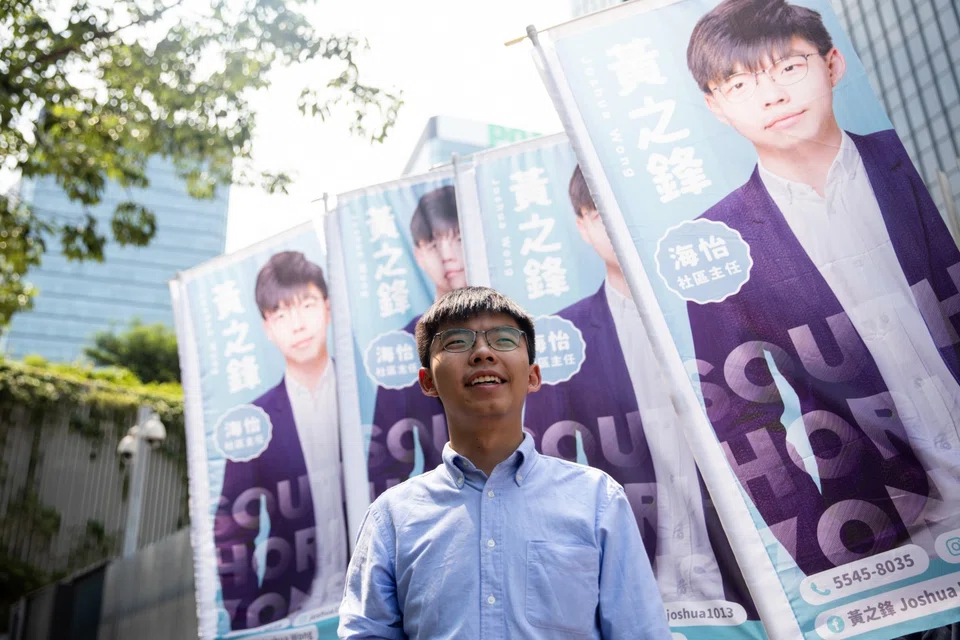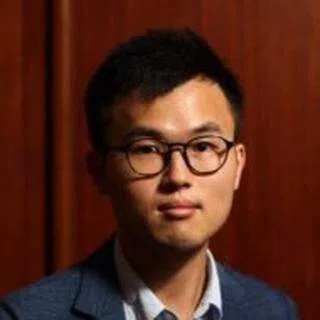Joshua Wong: I do not advocate independence
In this exclusive interview with Lianhe Zaobao, Joshua Wong Chi-fung boldly shares his views on Hong Kong's current political situation and his plans on running for local office. He rebukes that if China had made good on its promise of holding democratic elections in Hong Kong, "(We) wouldn't be protesting on the streets now".

"No one in Hong Kong sees me as the leader of this movement. I am just one of the movers who hope that the international community can hear the voices of the Hong Kong protestors."
Joshua Wong Chi-fung is the secretary-general of the Demosistō, a pro-democracy political organisation in Hong Kong. Since the 2012 movement against national education and the 2014 Occupy Central movement, Wong has come to be seen as the leader of social movements in Hong Kong, and a troublemaker in the eyes of those in the pro-establishment camp. However, during our interview, Wong was quick to reject any suggestion that he is the leader of the current anti-extradition bill movement.
On September 30, Lianhe Zaobao conducted an interview with Wong in Mandarin outside the central government offices. Even though he claims that he is not a leading figure (of the movement), the 23 year old was poised and at ease in front of the video camera, a world apart from his fresh-faced teen portrayal by the Western media and in documentaries several years ago.
"If we are unable to voice our demands inside the establishment, then the Hong Kong people cannot be blamed for taking to the streets to protest."
During the initial outbreaks of the anti-extradition bill protests on June 9, Wong was still serving his sentence after being convicted of a charge of contempt of court for disobeying a court order during the Occupy Central movement in 2014. On June 17, he made a high-profile move to join the protests immediately after his release from prison. In September, his visits to Germany and the United States etc. to garner support from the international community for the anti-extradition bill movement put him in the global limelight. In the US, Wong also participated in a Congressional-Executive Commission on China hearing.
Within a week of returning to Hong Kong from Washington, Wong promptly announced on September 28, the fifth anniversary of the Occupy Central movement, his intention to participate in the upcoming district council elections in November, proving himself to be a shrewd operator.
Wong spoke readily about his decision for doing so to this reporter. According to him, this was not a snap decision but one that he has been preparing for. He felt that participating in the district council elections was the most peaceful, rational and reasonable way of airing his demands from within the establishment. "If we are unable to voice our demands inside the establishment, then the Hong Kong people cannot be blamed for taking to the streets to protest," said Wong.
"One country, two systems" in Hong Kong has become "one country, 1.5 systems" instead.
Last year, Agnes Chow, a fellow Demosistō member, registered to participate in the Legislative Council by-elections but had her candidacy declared invalid by the electoral authorities because her party advocates self-determination, which runs contrary to the Basic Law and the "one country, two systems" principle. After the Agnes Chow incident, it remains to be seen whether Wong would be allowed to take part in the November elections, something that he is well aware of. When questioned, Wong was quick to warn that if the authorities bar him from taking part, the street protests would continue and they would face pressure from the international community.
Self-determination is often defined as the right of the people to choose its own political status and to determine its own form of economic, cultural and social development. The government of China's Hong Kong Special Administrative Region (HKSAR) said Demosistō's stance on the referendum was a contravention of the territory's Basic Law - a mini-constitution in place since the 1997 handover from British rule. "Upholding the Basic Law is a basic legal duty of a legislator," it said. "If a person advocates or promotes self-determination or independence by any means, he or she cannot possibly uphold the Basic Law or fulfil his or her duties as a legislator."
Wong blames the present turmoil in Hong Kong on the fact that the Hong Kong government was not elected by the people of Hong Kong. He also said that "one country, two systems" in Hong Kong has become "one country, 1.5 systems" instead. If China had made good on its promise of holding democratic elections in Hong Kong, "(We) wouldn't be protesting on the streets now".

Institutional reform to resolve Hong Kong's problems
Democratic elections in Hong Kong is by no means a straightforward issue. In 2014, the Standing Committee of the National People's Congress proposed an electoral reform in which the Hong Kong people could choose their next Chief Executive from a slate of two or three vetted nominees. However, the pro-democracy camp and individuals such as Wong were of the view that this did not constitute true universal suffrage. The controversy subsequently sparked off the Occupy Central movement.
In the present anti-extradition bill protests which have lasted nearly four months, universal suffrage is one of the five demands the protestors are fighting for. Wong is optimistic that there is still a chance that the demands would be met. According to him, prior to September, no one would have thought that the Hong Kong government would withdraw the amendment bill, "in the end, it was withdrawn". As such, even though there are those who are of the view that the central government in Beijing would never allow democratic elections in Hong Kong, "We (Hongkongers) would continue to fight for it".
... "they can smear all they want but there is no need to bother with such nationalist sentiments".
As for criticisms that the anti-extradition bill movement is becoming more violent and radicalised, Wong's reply was that if peaceful means were viable, the government would have withdrawn the amendment bill after a million Hong Kong people took to the streets on June 9. He would not reproach the protestors for using violence, but feels that institutional reform is needed to resolve the problems that plague Hong Kong.
Hong Kong is supposed to have a high degree of autonomy
Wong is of the view that there are those in Hong Kong who want democratic elections, as well as those who seek independence primarily because everyone feels that Hong Kong is being oppressed by the central government in Beijing. "Hong Kong is supposed to have a high degree of autonomy but that has not come true, and herein lies the problem."
Wong has been branded by Chinese media as the leader of the pro-independence movement in Hong Kong. During the interview, Wong did not hesitate to say, "I do not advocate independence for Hong Kong." According to him, recent protests in Hong Kong have been labelled by the Chinese media or government as pro-independence, but "the fact is, no one sees it that way". He also added deftly that "they can smear all they want but there is no need to bother with such nationalist sentiments".
According to the Basic Law, to become the Chief Executive, one needs to be at least 40 years old. Even though Wong is still young, he seems destined to embark on a political career. As for whether his political ambitions extend to running for the Chief Executive position one day, Wong merely quipped, "the position may no longer exist in five or ten years".



![[Photos] Fact versus fiction: The portrayal of WWII anti-Japanese martyrs in Taiwan](https://cassette.sphdigital.com.sg/image/thinkchina/3494f8bd481870f7c65b881fd21a3fd733f573f23232376e39c532a2c7593cbc)

